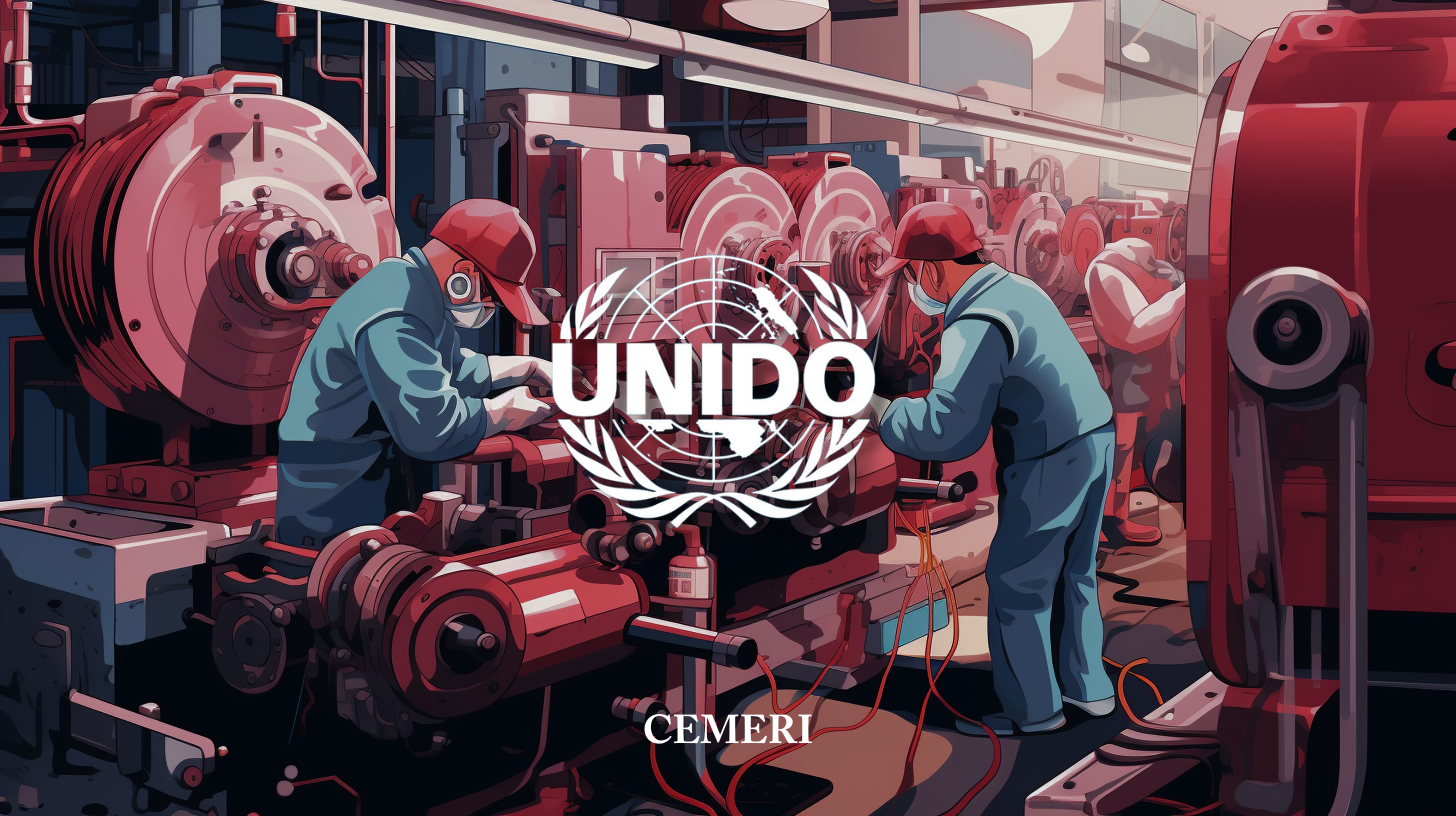Encyclopedia
Galia Morales
What is the United Nations Industrial Development Organization (UNIDO)?
- UNIDO promotes and accelerates the industrial development of developing countries while fostering cooperation among the over 170 member states of the organization.
?.webp?name=What is the United Nations Industrial Development Organization (UNIDO)?&format=webp&quality=55)
The United Nations Industrial Development Organization (UNIDO) or UNIDO (for its acronym in English) is the specialized agency of the United Nations (UN), in charge of promoting industrial development to reduce poverty, promote inclusive globalization and sustainable progress. This body was created on November 17, 1996, with headquarters located in Vienna. It was established under General Assembly resolution 2152 (UNIDO, 2022). Likewise, throughout its consolidation, UNIDO has had different reforms that were adopted in 1993, 1995 and 1997 with the purpose of improving the activities of the same organization.
Operation and conformation
UNIDO is composed of 171 Member States. Currently the Hon. Mr. Li Yong is the Director General of said body, appointed by the General Conference, for a term of 4 years. Said Conference, made up of all the Member States, meets every two years in ordinary session. It may also meet in extraordinary session.
The Industrial Development Council is composed of 53 members elected for 4 years by the Conference, according to the principle of equitable geographical representation. The Programs and Budgets Committee is made up of 27 members elected by the General Conference for a period of two years taking into account the same principle (France Diplomacy, 2022).
Objectives of UNIDO
As its name suggests, UNIDO promotes and accelerates the industrial development of developing countries, while promoting cooperation among the organization's more than 170 member states. Such development is carried out in order to contribute to the establishment of a new international economic order, based on cooperation at the global, regional and national, as well as sectoral levels.
For its part, UNIDO has three focuses of activities, covering:
- The reduction of poverty: Through different activities, initiatives, projects and productive forums that are organized in their institutions.
- Development of trade capacities: Through the promotion of industrial investment and technology (industrial policy, institutional capacity building, establishment of quality and metrology standards, industrial statistics and information through the network management, in particular information relating to technology transfers).
- Energy and the environment: Through support programs for ecologically sustainable industrial development strategies and technologies, including technology transfer, as well as the application of international treaties concerning the environment (France Diplomacy, 2022).
Accordingly, the Organization's approach is structured, as detailed in the Organization's Medium-Term Program Framework 2018-2021, into four strategic priorities:
- Creating shared prosperity
- Promotion of economic competitiveness
- Safeguard the environment
- Strengthening knowledge and institutions
Each of these fields of activity contains a number of individual programmes, which are implemented holistically to achieve effective results and impacts through UNIDO's four enabling functions:
- Technical cooperation.
- Research and analytical functions and policy advisory services.
- Normative functions and standards and activities related to quality.
- Calls and alliances for knowledge transfer, networking and industrial cooperation (UNIDO, 2022).
UNIDO within the 2030 Agenda
The efforts made at UNIDO are fully aimed at following the United Nations 2030 Agenda, its actions are recognized in SDG-9, which calls for "Build resilient infrastructure, promote inclusive-sustainable industrialization and foster innovation" ( UNITED, 2022).
The Organization defined thematic priorities for which it can provide a truly specific competence (investment promotion, institutional strengthening, agro-industries, clean industry), with an emphasis on the poorest countries (Africa in particular), agro-industries and SMEs . (France Diplomacy, 2022).
In keeping with the basic requirements of its mission, UNIDO has considerably increased its technical services in the last ten years. At the same time, it has increased its mobilization of financial resources, demonstrating the Organization's growing international recognition as an effective provider of catalytic services for industrial development.
UNIDO in the pandemic
Starting in 2020, UNIDO began to work together with its Member States and partners to respond to the consequences of COVID-19, in order to reduce and face the socio-economic damage and build a better future.
During the COVID-19 pandemic, economies with a strong and diversified industrial sector were found to be associated with less loss in Gross Domestic Product growth and faster recovery. Therefore, UNIDO's work in promoting inclusive and sustainable industrial development is of critical importance for socio-economic recovery and for building a more inclusive, sustainable and resilient future (UNIDO, 2022).
For this reason, the organization has covered several areas, the main one currently being the pharmaceutical sector. UNIDO provides technical cooperation and advisory services to boost local pharmaceutical production in developing countries. Recovery from the COVID-19 crisis, local pharmaceutical production capacity for essential medicines and vaccines is a key priority to reduce reliance on international donations and ensure resilience and preparedness for future crises (UNIDO, 2022).
Likewise, attention has been paid to supply chains and the development of commercial capacities. In the pandemic, countries enacted containment measures and border closures, leaving millions of people around the world without jobs. A publication from the International Trade Center shows that among the private sector, Micro, Small and Medium Enterprises (MIPYMES) are the ones that have suffered the most due to lack of support (UNIDO, 2022).
UNIDO, through the promotion and establishment of norms, works to support the Member States in the implementation of policies and norms that allow a sustainable and inclusive management of the supply chain, ensuring the integration of MSMEs, in the supply chains. global and regional value (UNIDO, 2021).
On the other hand, agribusiness, agribusiness and the issue of food security have been given priority. As a result of the lockdown, farmers were prevented from accessing markets and farmworkers from harvesting crops, disrupting national and global food supply chains while reducing access to healthy, safe and diverse diets (UNIDO , 2021).
UNIDO supports the development of sustainable food value chains and inclusive market systems, has promoted business opportunities for rural populations, has also strengthened markets to improve industrial linkages and economic transformations. As well as promoting employment and income opportunities.
On the other hand, the pandemic has aggravated the implications of the growing digital divide as well as exacerbated the existing inequalities between the developing and developed world. It has demonstrated and reinforced our reliance on technology in almost every facet of our daily lives, including remote education, work and health services, as well as for e-commerce and market access. The crisis has worsened which sheds more light on the need to promote and safeguard digital technologies to bridge the gap while providing help to all people.
A new approach to making the Fourth Industrial Revolution work for all has been introduced at UNIDO, and is based on four pillars: innovation, digital infrastructure, digital skills, cooperation and digital partnerships. Likewise, the Organization continues to promote the incorporation of a technological, sustainable transformation with a gender perspective to improve capacities in developing countries (UNIDO, 2021).
For its part, the pandemic has provided the opportunity to promote the reduction of fossil fuels, neutralize carbon to build greener and more sustainable economies. The body has been working to achieve a system that allows growth while protecting the environment and promoting inclusion. This is possible thanks to technical and policy advice on the adoption of cleaner and more efficient energy systems, advocating for the transition towards low carbon economies and for the adoption of circular economy approaches (UNIDO, 2021).
In conclusion, UNIDO works together not only with Member States but also with the private sector and other international organizations both governmental and non-governmental with the aim of covering various industrial sectors. Currently, he has been focused on the agricultural, food, pharmaceutical, technological, digital and energy industries. All this, through its analytical and policy advisory services.
UNIDO provides Member States with tools to design, appropriate and implement industrial strategies and policies. There is a specific Department of Policy Research and Statistics which publishes a series of analytical studies and opinion articles on the global impacts and now the effect of Covid-19. Along with the joint work of the United Nations Sustainable Development Goals, as mentioned above, UNIDO works multilaterally to achieve a better present and future in the world.
Sources
Diplomacia Francia, (2022). Organización de las Naciones Unidas para el Desarrollo Industrial (ONUDI). Recuperado de: https://www.diplomatie.gouv.fr/es/politica-exterior/francia-en-naciones-unidas/organizaciones-economicas-y/instituciones-de-las-naciones/article/organizacion-de-las-naciones
UNIDO, (2021). Agro-industry, agrobusiness and food security. Recuperado de: https://www.unido.org/our-focus-building-better-future/agro-industry-agribusiness-and-food-security (traducción propia)
UNIDO, (2021). Buiding a better future. Recuperado: https://www.unido.org/our-focus/building-a-better-future(traducción propia).
UNIDO, (2021). Pharmaceutical capacity and infraestructura. Recuperado de: https://www.unido.org/our-focus-building-better-future/pharmaceutical-capacity-and-infrastructure (traducción propia)
UNIDO, (2022). Who we are. Recuperado de: https://www.unido.org/who-we-are/unido-brief (traducción propia).

